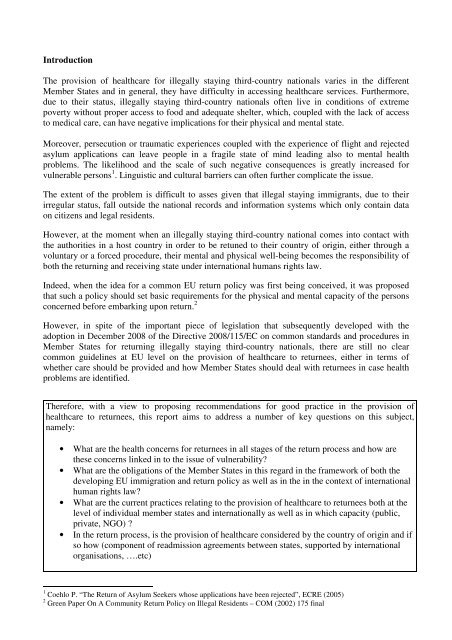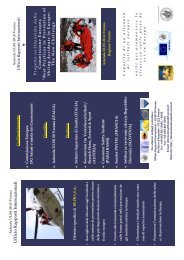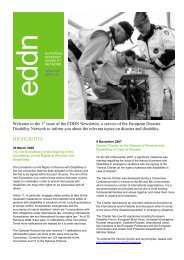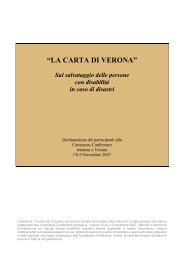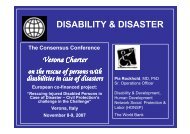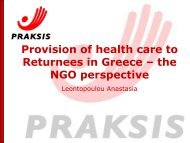AZIENDA ULSS 20 DI VERONA - ULSS 20 Verona
AZIENDA ULSS 20 DI VERONA - ULSS 20 Verona
AZIENDA ULSS 20 DI VERONA - ULSS 20 Verona
Create successful ePaper yourself
Turn your PDF publications into a flip-book with our unique Google optimized e-Paper software.
Introduction<br />
The provision of healthcare for illegally staying third-country nationals varies in the different<br />
Member States and in general, they have difficulty in accessing healthcare services. Furthermore,<br />
due to their status, illegally staying third-country nationals often live in conditions of extreme<br />
poverty without proper access to food and adequate shelter, which, coupled with the lack of access<br />
to medical care, can have negative implications for their physical and mental state.<br />
Moreover, persecution or traumatic experiences coupled with the experience of flight and rejected<br />
asylum applications can leave people in a fragile state of mind leading also to mental health<br />
problems. The likelihood and the scale of such negative consequences is greatly increased for<br />
vulnerable persons 1 . Linguistic and cultural barriers can often further complicate the issue.<br />
The extent of the problem is difficult to asses given that illegal staying immigrants, due to their<br />
irregular status, fall outside the national records and information systems which only contain data<br />
on citizens and legal residents.<br />
However, at the moment when an illegally staying third-country national comes into contact with<br />
the authorities in a host country in order to be retuned to their country of origin, either through a<br />
voluntary or a forced procedure, their mental and physical well-being becomes the responsibility of<br />
both the returning and receiving state under international humans rights law.<br />
Indeed, when the idea for a common EU return policy was first being conceived, it was proposed<br />
that such a policy should set basic requirements for the physical and mental capacity of the persons<br />
concerned before embarking upon return. 2<br />
However, in spite of the important piece of legislation that subsequently developed with the<br />
adoption in December <strong>20</strong>08 of the Directive <strong>20</strong>08/115/EC on common standards and procedures in<br />
Member States for returning illegally staying third-country nationals, there are still no clear<br />
common guidelines at EU level on the provision of healthcare to returnees, either in terms of<br />
whether care should be provided and how Member States should deal with returnees in case health<br />
problems are identified.<br />
Therefore, with a view to proposing recommendations for good practice in the provision of<br />
healthcare to returnees, this report aims to address a number of key questions on this subject,<br />
namely:<br />
• What are the health concerns for returnees in all stages of the return process and how are<br />
these concerns linked in to the issue of vulnerability?<br />
• What are the obligations of the Member States in this regard in the framework of both the<br />
developing EU immigration and return policy as well as in the in the context of international<br />
human rights law?<br />
• What are the current practices relating to the provision of healthcare to returnees both at the<br />
level of individual member states and internationally as well as in which capacity (public,<br />
private, NGO) ?<br />
• In the return process, is the provision of healthcare considered by the country of origin and if<br />
so how (component of readmission agreements between states, supported by international<br />
organisations, ….etc)<br />
1 Coehlo P. “The Return of Asylum Seekers whose applications have been rejected”, ECRE (<strong>20</strong>05)<br />
2 Green Paper On A Community Return Policy on Illegal Residents – COM (<strong>20</strong>02) 175 final


